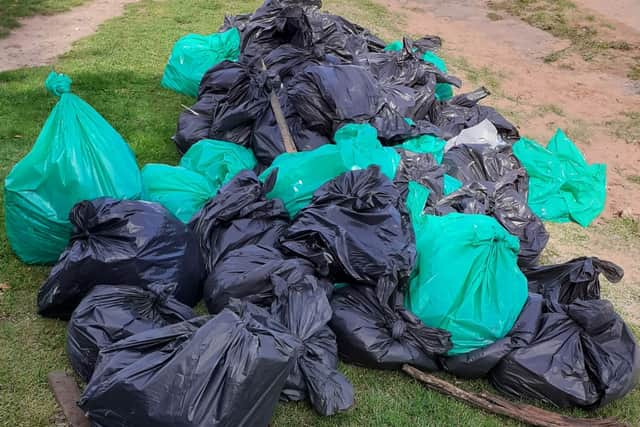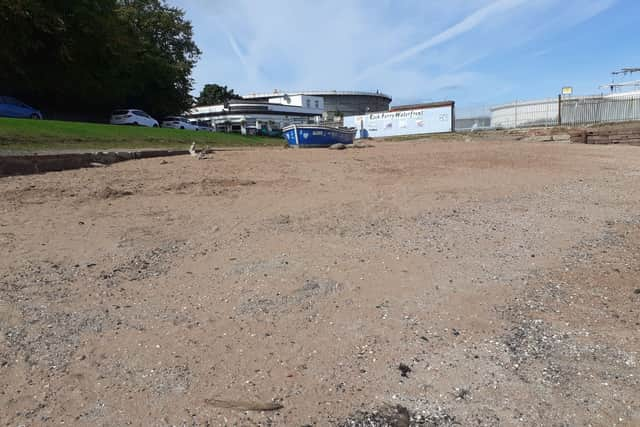Sewage and sanitary products found on Wirral beach
and live on Freeview channel 276
A community group found thousands of wet wipes and other sanitary products on a beach, they say came from sewage.
The Marine Conservation Society does a beach clean up near the Refreshment Rooms in Rock Ferry every 12 weeks. The latest, on Saturday, September 17, saw nearly half a tonne of litter or 80 bags picked up by 40 people. The group said they usually pick up twice this amount.
Advertisement
Hide AdAdvertisement
Hide Ad

Much of this litter the group believe is related to United Utilities sewage pipes that discharge into the Mersey nearby at a number of sites. A survey done in July found more than 4,000 wet wipes on the beach, 93% of all the litter picked up.
United Utilities said there were many sources of pollution in the river and that it had recently upgraded a site nearby. It urged residents not to put plastic and litter down drains.
Adrian Keeler, a member of the Marine Conservation Society, said: “We regularly remove in excess of one tonne of this material from an area no bigger than a football pitch. The discharges are from various sewage overflow outlets upriver. The beach cleans have been going on for more than seven years now with no signs of the problem getting any better.
“It’s pretty grim to be honest. The Refreshments Rooms restaurant is right by this small beach and they have been very supportive of our efforts as it helps create a better environment for visitors down there.”
Advertisement
Hide AdAdvertisement
Hide AdAlan Tuohey, one of the owners of The Refreshment Rooms, said: “It doesn’t help. It’s not immediately obvious if I am honest but it seems to be mostly wet wipes.
“We get involved and we support them by advertising for volunteers on our pages and supplying them with tea and coffee afterwards, it’s a joint effort really.”
In 2021, sewage was discharged for 20,345 hours across Wirral, the equivalent of 2.3 years with an average of nearly eight spills per day according to the Rivers Trust sewage map. United Utilities made up 93% of all sewage spills.
What have water suppliers said?
United Utilities manages most sewage outflows while 10% are managed by Welsh Water in Heswall and parts of south-west Wirral.
Advertisement
Hide AdAdvertisement
Hide AdA United Utilities spokesperson, said: “Due to the size and tidal nature of the River Mersey there are numerous potential sources for the waste that gets washed up on the banks of the river.
“During storm conditions, when sewers are running at full capacity, we are permitted to spill excess storm water from storm overflows to help prevent the flooding of streets, homes and businesses.
“Over the past twenty years, we have invested £1.2bn improving storm overflows to reduce the amount and impact of spills, and we’ll be investing a further £230m in the next two years at more overflow sites to improve 184km of waterways across the region.
“In the Wirral, we have upgraded our site at the Dell in New Ferry to provide extra resilience for the network and we are also using a new innovative approach to monitor the sewers through sensors. The real-time data this gives, allows us to analyse the performance of the sewer network and pro-actively spot any potential issues.
Advertisement
Hide AdAdvertisement
Hide Ad

“It’s important to remember that things like wet wipes should not be disposed of down the toilet. Only the three Ps should be flushed – pee, poo and (toilet) paper. We can all play our part by putting bathroom rubbish in the bin and not down the drain or the toilet.”
A Welsh Water spokesperson said: “Combined Storm Overflows (CSOs) play a vital role in preventing homes being flooded following rain and storms because most of our network is a combined system that collects surface as well as waste water. The operation of our CSOs – which mainly release surface water that enters our sewers due to rainfall – is highly regulated. We have monitors on over 99.5% of our CSOs and are fully transparent with the data from our monitors and publish this on our website.
“Whilst our CSOs are mainly operating as designed and permitted, we recognise that with environmental legislation tightening and customer expectations changing, more needs to be done to improve their performance. That is why we’re investing £836m in our waste water network over the five years to 2025. We have also just announced an additional £100m investment which will include further improvements to CSOs.
“Customers can also help by not placing items such as wipes, nappies and cotton buds down the toilet. We always encourage customers to follow this advice through our Let’s Stop the Block campaign and we thank customers for supporting us on this.”
Comment Guidelines
National World encourages reader discussion on our stories. User feedback, insights and back-and-forth exchanges add a rich layer of context to reporting. Please review our Community Guidelines before commenting.